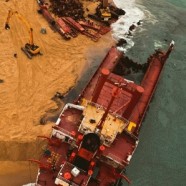When Life Gives You Bremens…
The cutting out of the cargo ship is a provocation regarding every observer endowed with common sense. The photos of the demolition demonstrate that even while the wreckage has its keel in the water, the shearing continues. The images of the polluted scrap metal floating in the sea water are overwhelming. They prove that the idea men and the workers on site disregard the marine environment, underestimating the effects of the contamination of the ecosystem and of the neighbouring marine communities by micro-pollutants from lead paint and operational residue from the ship itself. This shearing phase of the ship in the waves is comparable to rinsing scrap metal in the sea.
TK Bremen: Robin Des Bois draws out a prefectural mandate on emergency conservation efforts.
Following the Robin des Bois press conference this morning at 10:00 AM at Brest, the prefecture of Morbihan made public on their website at 2:34 PM the prefectural mandate regarding emergency conservation efforts surrounding the worksite for the deconstruction of the cargo ship TK Bremen. The recipient of this prefectural mandate is the ship owner, Blue Atlantic Shipping, ltd. based in Malta.
Robin des Bois estimates that the emergency conditions invoked by the prefecture are intended to precipitate work upon the demolition of the TK Bremen, to know the fragility of the hull, are not one in the same. If there is an emergency, it is to erase as fast as possible the traces of errors made at the time of the casting off of the ship and its navigation in the afternoon of December 15, 2011 and the night of the 16th.
TK Bremen: Robin Des Bois draws out a prefectural mandate on emergency conservation efforts.
Following the Robin des Bois press conference this morning at 10:00 AM at Brest, the prefecture of Morbihan made public on their website at 2:34 PM the prefectural mandate regarding emergency conservation efforts surrounding the worksite for the deconstruction of the cargo ship TK Bremen. The recipient of this prefectural mandate is the ship owner, Blue Atlantic Shipping, ltd. based in Malta.
Robin des Bois estimates that the emergency conditions invoked by the prefecture are intended to precipitate work upon the demolition of the TK Bremen, to know the fragility of the hull, are not one in the same. If there is an emergency, it is to erase as fast as possible the traces of errors made at the time of the casting off of the ship and its navigation in the afternoon of December 15, 2011 and the night of the 16th.
The TK Bremen Situation
A Demolition Derby
The demolition of the TK Bremen on French territory is a spectacular example of the administrative simplification so dear to the government. The dumping of this industrial waste amounting to 2,000 tons is containing asbestos in several forms, polychlorinated biphenyl (PCB), hydrocarbon traces, lead paint, mercury and tin are not submitted to French and European control’s temporary authorization for a Classified Facility for the Protection of the Environment. The guidelines of the Bale Convention and the International Maritime Organization on the dismantlement of ships are not being respected. Robin des Bois requests that the prefect of Morbihan, the maritime prefecture, and the labor inspectors publish the map of dangerous waste present on the TK Bremen, if it exists.










